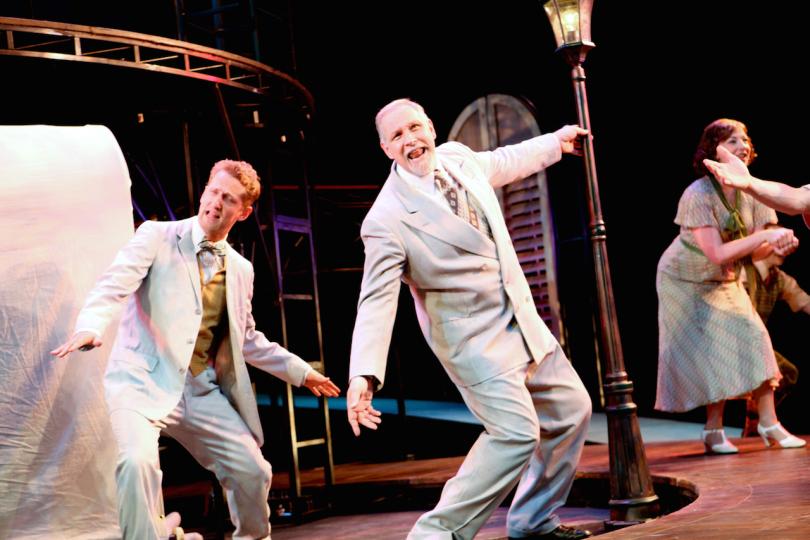Summer theater and its discontents

Oh, summer in the Twin Cities: a time of sunshine, outdoor recreation, and refreshing cold beverages on outdoor patios. For the next three months, we will gradually acclimate to rising humidity and mosquito populations in one of the nation’s best metropolitan areas for parks, biking, and craft breweries.
In the doldrums of winter, going to the theater is a warm refuge, whether you go to see something cheery and spirit-lifting or a challenging, provocative piece to shock your brain out of its seasonal depression. But once Memorial Day hits, all of a sudden, there are lots of events competing for our attention: movies in the parks, block parties, Open Streets events, art fairs, or weekend excursions outside the city. Even if I have no plans at all, I have a hard time walking into a theater at 7:30 when I know it’s going to stay light out until after 9.
So what’s a theater company to do? Assuming that ticket sales will probably drop over the summer, many smaller companies go on hiatus or save up their energy for Fringe – but not all. There are a few different strategies that theater companies are using to keep going through the summer, but when it comes to competing with all the other things we could be doing, some are doing better than others at thinking outside the box.
Of course, there's Shakespeare
One summer theatrical mainstay, for instance, is outdoor Shakespeare. This actually has its roots in 1962 in New York, when Joe Papp created Shakespeare in the Park in order to make theater “as readily available to all walks of people as library books.” This feels like the perfect goal for summer theater, whether Shakespeare or not: make it community-based and accessible, both physically and financially.
Although it doesn’t attract the round-the-block lines of NYC’s Shakespeare in the Park, we do have our own outdoor Shakespeare each summer – in public parks from the Classical Actors Ensemble and Cromulent Shakespeare Company, and up in White Bear Lake from Shakespeare and Company. This year, Cromulent is doing Much Ado About Nothing, both Classical Actors and Shakespeare and Co are putting on A Midsummer Night’s Dream, and Shakespeare and Co also has productions of The Tempest and Molière’s The Learned Ladies. (Can the market bear this much Shakespeare per capita?)
But I am always more intrigued by the offerings beyond Shakespeare. If you’ve been keeping your eye on outdoor theater events for the past few years, you know about Mixed Precipitation’s picnic operettas, which mix pop songs in with classical arias and include delicious snacks that are passed around at cleverly thematic moments. They perform in community gardens, so you’re surrounded by fresh veggies and have an opportunity to bike over to a new neighborhood to check out the show.
And TigerLion Arts’s Nature, which is a “walking play” about Emerson and Thoreau, is touring the Midwest this summer, which is great for them and too bad for us: it doesn’t get back to Minnesota until late September.
Finally, for the littlest people with the shortest attention spans, there’s Things with Wings, a 45-minute kids’ show in Silverwood Park in St. Anthony, featuring bird puppets by artists from In the Heart of the Beast. Silverwood Park also has a show starring a puppet called Ned the Nerdy Naturalist, which I love based on the title alone.
All of these ideas fully make sense to me. It is beautiful outside – so companies are working with the season and inviting me to sit somewhere green while I watch their show. Plus, most of these productions are free (or based on suggested donation) and also family-friendly, which makes them perfect if you have a small human that needs some entertainment during a long summer.
And some surprisingly challenging plays
The Guthrie and the Jungle have a different strategy to draw summer audiences by keeping some more serious work in their programming, which is rarely a bad thing. The Guthrie is putting on Ayad Akhtar’s Disgraced, a Pulitzer-winning play dealing with Islamophobia, and the Jungle has Philip Dawkins’ Le Switch, which focuses on GLBT issues. So you couldn’t say that they’re phoning it in for summer audiences.
But honestly, I’m not sure if the turn towards identity politics is a smart move or not. On the one hand, if anything’s going to drag me indoors this summer, it’s going to be something that I am reasonably sure will be well-produced and intellectually stimulating. On the other hand, if audience turnout ends up being lower for these shows, then it would mean that we’re doing a major disservice to some potentially important and interesting plays. I can only assume that Joe Haj and Sarah Rasmussen know their numbers and can reliably predict at least a respectable level of ticket sales.
Either way, it is nice to see a couple of serious offerings amidst the sea of summer fluff – because beyond the shows I’ve mentioned above, that seems to be all that’s left. Just for starters, we’ve got Calendar Girls at the Park Square, South Pacific at the Guthrie, and Glensheen is back at the History Theater. And I’m not even going to try to list everything outside the Twin Cities, in communities like Anoka, Lanesboro, and New Prague, which are wisely providing some options for the low-key weekend getaway when you realize that there actually isn’t that much nightlife in small-town Minnesota.
The Fringe Festival
Then there’s Fringe. Fringe is huge. It’s been selling upwards of 50,000 tickets annually for the last three years. Of any venue in the Cities, it’s the one that consistently draws the round-the-block lines. In the past, however, Fringe has not been what I’d call accessible – at $12 a ticket, it can be a pretty significant financial decision to decide to see multiple shows, particularly when a lot of the appeal of Fringe is in the risk of seeing something totally new.
But there’s been a big change at Fringe for this year – from a per-ticket price, they are switching to the model of a $16 or $22 day pass (for weekdays or weekends). This is not only much less of a financial burden, but also a huge incentive to see multiple shows in one day. And it’ll hopefully give a boost to the riskier shows that have struggled to draw audiences in the past. Maybe, finally, this is a model of accessibility and community gathering that could rival Joe Papp’s Shakespeare in the Park.
Still, I just can’t fully resign myself to waiting for those ten days in August. A part of me keeps hoping that more companies will seize June and July as an opportunity to stage something new, innovative, and outdoors.
But, until that happens, it’s summer – so at least there are loads of other things to do.




